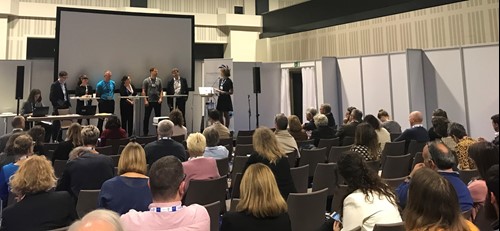Report from Aquaculture Europe
Claudia Tschesche is a second year PhD student at the Institute of Aquaculture at the University of Stirling and the recipient of a SAIC travel grant. She attended the 2019 Aquaculture Europe Conference (AE19) which took place in Berlin on 7 -10 October. Here is her report:
At the AE19 conference, I gave a talk and presented a poster on my research on the molecular mechanisms underlying deltamethrin (AMX®) resistance in parasitic salmon lice.
The worldwide estimated cost of sea lice to the salmon farming industry in 2018 was approximately £700 million. Whilst non-medicinal treatments are increasingly employed, the combat against sea lice still relies on veterinary drugs such as deltamethrin. However, the use of deltamethrin is threatened by the development of resistance and its molecular mechanisms in sea lice are still largely unknown. I am investigating the molecular mechanisms of deltamethrin resistance in order to develop reliable tests for the detection of resistance in salmon louse pest management.
My major motivation for attending AE19 was that it is a huge cross-thematic conference; attended by over 2,700 people from 85 countries. Under the slogan “Our future growing from water” the conference covered topics like health, nutrition, welfare, breeding and genetics, and rearing technologies of fish, crustaceans, molluscs, and algae in more than 15 sessions per day. The conference also addressed the challenges of climate change, the management of ecosystems and the environmental impact of aquaculture. I attended many presentations on a variety of topics and therefore managed to learn about new technologies and methods of analyses used across many different disciplines.
I particularly enjoyed the close link between research and industry at this conference. This year, AE19 featured a trade show with 150 stands, where international companies presented their latest products and services.
The standout sessions and panel discussions included the EU EATIP day and the Innovation Forum, which focused on innovation and technologies in aquaculture. It was a great opportunity for me to learn about EU-funded projects, the visions of start-ups, and sustainable mariculture at lower trophic level.


AE19 was the first large international conference where I gave a talk on my latest research results. This experience has boosted my confidence in my presentation and networking skills, and increased the interest of other researchers in my research project. It was also very beneficial to receive constructive feedback on my work from the research community.
I was especially interested in presenting my work at this conference because as a German, my country hosted this event. The German aquaculture sector is diverse, but still small by international comparison. The AE19 German Industry Forum provided a great occasion to gain insights into current aquaculture research projects in Germany and I hope that some of the connections I made will result in new opportunities after completing my PhD.
Overall, I had a great time at AE19 in Berlin and enjoyed sharing the German culture and traditions with my international colleagues. I gained a lot of knowledge and hope that some of the connections I made will result in new opportunities in future.
Find out more about PhD travel grantsShare this